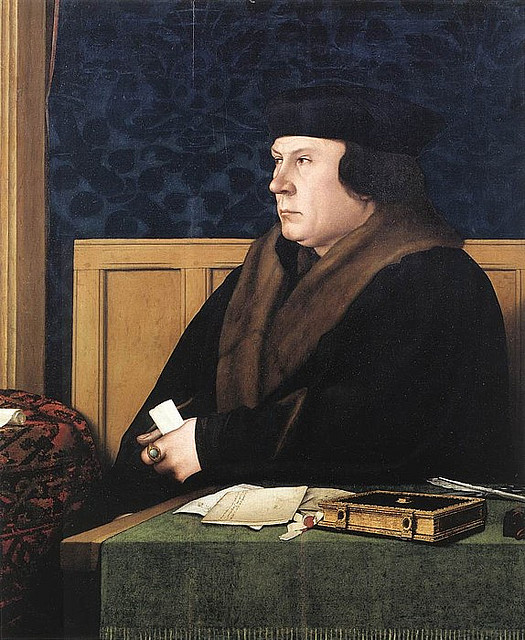
Thomas Cromwell
The words ‘historical drama’ are usually enough to incite fear into the historian; all too frequently, they are just too fantastical or, even worse, just plain boring. Based on Hilary Mantel’s 2009 and 2012 novels, ‘Wolf Hall’ and ‘Bring Up the Bodies’, BBC2’s new Tudor historical drama has altered this trend; perfectly combining fiction and biography. ‘Wolf Hall’ interprets the Tudors in a new direction. A ‘reformation’, if you will! This new series will eventually depict the rise of Thomas Cromwell, and this week viewers were concerned with the establishment of Cromwell at court, and the demise of Thomas Wolsey. It didn’t just set the scene of draping a Tudor background behind the real drama, but the Legatine Court and Percy factionalism were the events themselves. The historical detail was packed in, but at no point patronizing. Politics, characters and events were all recalled via dialogue between the characters themselves. Wolsey’s experience was deployed both to inform Cromwell and the viewer alike of the Catherine of Aragon consummation controversy. Admittedly, I was lost at certain points during Philippa Gregory’s ‘The White Queen’ adaption, but ‘Wolf Hall’ didn’t leave me needing to know more. It gave me every detail I needed about the significance of vernacular ecclesiasticism to be able to feel the poignancy of Cromwell’s flashback, of reading a prayer book with his daughter. Tudor literacy was not assumed, but neither was ‘Wolf Hall’ tedious for the historian viewers; I know a lot about Cromwell’s career, so the insight into his family and childhood wasn’t just sweet, but refreshing.
Spoiler alert! I cried when Cromwell’s wife and daughters died, but the subtle, single tear rolling down Cromwell’s cheek was historically fascinating too. Not only did their succumbing to ‘sweating sickness’ broach the stark reality of sixteenth-century mortality to a disease which claimed 2,000 victims in London in 1528 alone, but Cromwell’s reaction sheds light on the importance of family in early modern England. This is a topic increasingly discussed by historians, most notably Durham’s own Andy Wood, but the gentle and playful way in which Cromwell treated his daughter who could not sleep for being too warm does away with the presumption that children who are both seen and heard are a modern phenomenon. The contrast with which Cromwell chastised his son, Gregory, for his erring Latin hinted that patriarchy was not full of joviality and jousting, but was strict and hard work.
Wolsey was presented as neither politician nor prodigy, but loyal friend. It would have been easy to isolate Wolsey and Cromwell in a vacuum, but ‘Wolf Hall’ humanised the entire Tudor court. Now I’m not expecting Cromwell to have actually retorted, “What’s that, a f***ing accident?!” in allusion to More overtaking his Lord Chancellorship; even less likely was he to have enquired “the recipe for this sauce”. Nonetheless, the Windsor, Esher Place and Barrington Court retinues resound with banter, echoed by Mary Boleyn’s gossiping of her sister’s flat chestedness. It’s this brazen audacity with regards to such trivial matters which adds grit to the characters, making the interaction between the factions a nitty reality. Neither humanity nor history were compromised in ‘Wolf Hall’, which made it so fascinating to watch. Cromwell’s wit was deployed sensitively and sassily persuading the viewer and the king of his political potential. I was similarly surprised by the vulnerability with which Wolsey was portrayed, a far cry from the titled megalomaniac historiography has tainted him as. Jonathan Pryce’s Wolsey was fragile and a maverick, wholly deserving of Cromwell’s loyalty. It is by showing Wolsey at his point of susceptibility, in conjunction with Cromwell at his most emboldened to do right by Wolsey and England, that ‘Wolf Hall’ has value.
Authenticity certainly abounded ‘Wolf Hall’, to the extent that the only lighting used was that of candles and hearths; no plastic water bottles in sight (*ahem* ‘Downton Abbey’!). But this didn’t hamper the drama; the palaces were opulent yet Cromwell’s blacksmith was gritty, revealing just how cosmopolitan Tudor culture was. If you’ll excuse the pun, the background music was well tuned too; flutes and pipes sounded the scenes, triumphant, reverent, and really quite articulate of the prevailing mood for each scene. I can’t work out if ‘Wolf Hall’ more brought the Tudors to the 21st century or took us to the heart of the early Tudor years. Rather, it did both in a sophisticated, yet thrilling manner.
‘Wolf Hall’ was dramatic, but did not unnecessarily dramatise its characters and this crucial subtlety makes me very excited for next week’s episode. Unlike ‘Broadchurch’, we all know what happens next, but similar to that show, I can’t wait to see the next episode, even if it does mean the downfall of a very likeable Wolsey.
Episode one of ‘Wolf Hall’ can be viewed on BBC iPlayer, and the second episode will air on Wednesday 28 January at 9pm on BBC2.
